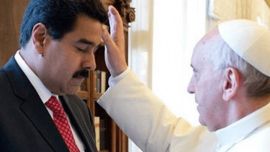The acceleration of our sense of reality is such that things that happened very recently, and had an intense effect on how we see our world, sometimes feel as if they occurred a long time ago. Since the general election, featuring Sergio Massa’s surprise victory over Javier Milei, the feeling in Argentina is that the economy minister is on his way to the Casa Rosada, despite the fact that every piece of empirical evidence suggests we are headed toward an extremely tight election where the final winner will be decided by a minimal margin. Little does it appear to matter that the ultra-libertarian economist managed a surprise victory in the PASO primaries that placed him in first and installed him as front-runner in the presidential race, potentially claiming victory in the first-round vote. Massa was relegated to third place, below Juntos por el Cambio, which ultimately proved worthless as the opposition were left out of the run-off when only a year ago it seemed like they had the election in their pocket. If in the immediate aftermath of the primaries, Milei’s win was inevitable and now Massa’s surprise victory in the general election makes it seem that he cannot lose. If very recent events are to be considered in our mental models when trying to project the future, things are as uncertain as ever. If that has remained, everything else seems to have changed radically.
It’s always important to check oneself before looking at election polls these days, which even in their absolute inefficacy, are delectable. Picked because it proves the author’s point, a recent survey put out by Inteligencia Analítica — a political consultancy firm run by Massa’s own brother-in-law — indicates Milei has a very narrow lead in a run-off scenario with a huge number of undecided voters and those opting for a blank vote. According to the figures, which weren’t publicly released by the pollster, La Libertad Avanza would takes 41 percent of the vote in a run-off scenario if it were today, compared to 37.2 percent for Unión por la Patria, 10.7 percent blank votes and another 11.1 percent undecided. The survey had a statistical margin of error of 1.8 percent. A projection taking into account “affirmative votes” only puts Milei’s libertarian coalition at 52.5 percent and the Peronists at 47.5 percent, with blank votes coming in at 12.6 percent. A third scenario in which the pollsters asked specifically about the Milei-Victoria Villaruel ticket facing off with Massa and Agustín Rossi resulted in a “technical tie,” 43.3 percent to 43.1 percent respectively. In this case, 6.3 percent decided for a blank vote and 7.3 percent remained undecided. According to the consultants, La Libertad Avanza would retain 70 percent of Patricia Bullrich’s vote and 50 percent of Horacio Rodríguez Larreta’s. Ultimately, this study, along with the few that have come out since the general election, suggest that the jury is still out and both teams have a substantial chance of winning if they pick the successful strategy.
Therein appears the question: what the winning strategy actually is. Starting with Milei, his alliance with Mauricio Macri and Bullrich was probably not unexpected, but it created a great deal of noise that could make or break his chances of winning. While the former president had been flirting with the libertarian for quite some time, their late-night meeting and the subsequent unilateral message communicating their pact rattled Juntos por el Cambio. There were little doubts that an internal rift between hawks and doves was tearing the opposition coalition apart at its seams, with a group responding to the Unión Cívica Radical and close to Rodríguez Larreta pushing for a centrist approach, and another closer to Macri and Bullrich looking to harden the coalition’s stance. The latter won, but after losing in the general election, their leadership has been called into question. A large portion of coalition members have already publicly said they would remain neutral, with harsher language for Milei than for Massa. A second group, seen as Macri’s fans, spent the campaign vehemently arguing against Milei, who was Bullrich’s antagonist, and is now looking to figure out how to look coherent and back the libertarian.
This has diluted Milei’s image to a certain extent, giving his detractors further evidence that he is nothing more than “power’s pussycat,” as Myriam Bregman dubbed him in the debates. Not only has Milei signed a deal with the political caste, his leadership is being called into question as Macri takes the front seat. Furthermore, the economist has begun to suffer from overexposure as scrutiny of his televised appearances is made viral on social media suggesting he is “crazy.” Macri, on the other hand, is going all in behind Milei, risking a clean break in the coalition he worked so hard to build at a moment of substantial power, with 10 governors and a solid congressional showing. Will he convince enough of his former supporters to jump on the Milei bandwagon, especially after the harsh language he’s used to refer to most of them, especially the Radicals? Most of Juntos por el Cambio’s leadership seems to despise Macri at this moment, apparently allowing his insatiable ego to take centre-stage once again. This level of ambition generates collateral damage, but if he gets his way, they’ll probably come crawling back.
Across the aisle, Massa and his crew are delighted to see their political opponents on the verge of civil war, many of them forced to tacitly defend him in the face of a potential Milei endorsement. The economy minister is a master magician to a certain extent, still in the race after a disastrous third-place result in the PASO primaries. He’s the representative of a failed government led by Alberto Fernández and Cristina Fernández de Kirchner, both of whom have disappeared in plain sight (another magic trick), who has been in charge of the Economy Ministry as inflation has spiralled out of control and the black market peso-dollar exchange rate has gone through the roof. Little does it matter, apparently, to his voters, as Massa managed a massive comeback that allowed him to take first place in the general election and ride the wave of enthusiasm that has convinced many, including the ‘círculo rojo’ establishment of decision makers and businessmen that he’s their guy. Incredibly enough, the candidate who has led a Ministry known for its direct influence in the private sector through the picking of winners and losers when it comes to access to much-needed dollars and imports, is more popular than the supposed champion of laissez faire economics among business leaders. Another example of Argentine 'realismo mágico.'
If his first trick was managing to claw back enough votes to become the frontrunner ahead of the ballotage, now Massa needs to retain and grow his electorate to win. He’s already unleashed as many voter-friendly policies as he’s had the time and resources to do so during this electoral campaign, and will continue with the 'plan platita' until the day of reckoning. Yet, in order to attract that dubious voter who is unconvinced by Milei and his supposed “anti-democratic ways,” he will have to perform the most difficult, and dangerous, trick in the book: proving that he is not related, in any way, to Kirchnerism. Massa has come to be known as an opportunist with several runs in the Kirchnerite team despite having previously said he’s looking to obliterate them. He counts on Fernández de Kirchner in his corner, and son Máximo K, together with CFK’s protégé Eduardo ‘Wado’ De Pedro, as his congressional leaders. For the anti-Peronist, anti-Kirchnerite field, voting for Massa is going a step too far, unless they can be convinced that he is truly 'de-Kirchnerised.’ Many among the UCR’s ranks, along with the disillusioned at Juntos por el Cambio, have spent a decade denouncing anything that looks or smells like Kirchnerism. In great part, that criticism extends to most of Peronism, with Massa’s opportunistic behaviour as a demonstration of an unstoppable will for power ultimately eroding the Republic. Now, they must pick between Milei, Massa, and a blank vote.
Thus, Milei and Massa’s negative attributes seemingly play a bigger role than their campaign promises or whatever attracts their core voters. Macri has jumped right back into the ring, become Milei’s main supporter, while Massa is trying to build off the momentum of the surprise win in the general election. The game remains completely up for grabs, and both of them are playing hard, even dirty.






















Comments